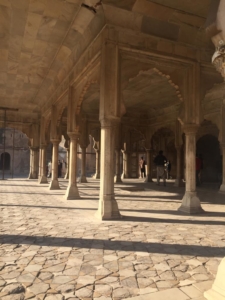When I began working on my project FilmWalli, I gave myself the goal of writing 5 short film scripts where each story would be stylistically like a folk tale and set against a South Asian backdrop. These stories would be for children to explore and negotiate complex social issues that most of us still struggle facing as adults.
The project was important to me because I had previously worked as a producer and scriptwriter, creating animated content in Pakistan. I worked at an animation studio and the stories I produced there were based on the lives of real life people on the ground who were heroes in every right as they strived for change against great odds. These have always been the kind of stories I have loved telling.
 When I applied to the Otherwise Fellowship I had felt a bit lost, if I’m honest. I had just left Pakistan because an IMF loan had meant that the currency was being valued differently and many of us saw costs rising but our salaries staying the same. Cinemas had lost business and were shutting down because Indian films were banned in Pakistan over growing tensions along the Kashmir border. Then when Covid came along it was the final blow for most animation studios in the country. I was among the lucky few to find work abroad in Thailand before Covid hit and although I was still working in animation, I found myself starting again in another country as a production coordinator on more commercial projects, which meant that I was no longer able to tell stories set in South Asia.
When I applied to the Otherwise Fellowship I had felt a bit lost, if I’m honest. I had just left Pakistan because an IMF loan had meant that the currency was being valued differently and many of us saw costs rising but our salaries staying the same. Cinemas had lost business and were shutting down because Indian films were banned in Pakistan over growing tensions along the Kashmir border. Then when Covid came along it was the final blow for most animation studios in the country. I was among the lucky few to find work abroad in Thailand before Covid hit and although I was still working in animation, I found myself starting again in another country as a production coordinator on more commercial projects, which meant that I was no longer able to tell stories set in South Asia.
When I was awarded the Fellowship I was able to use the fellowship to pull back the support and resources I needed to continue writing the stories I wanted to tell. I purchased a year’s long subscription to a “Women In Animation” membership. This allowed me to join a mentorship circle alongside a group of amazing like-minded women in the animation industry under the mentorship of a rock star animation veteran, Chris Perry. Chris is a director, writer and complete legend in the industry, having worked at major studios such as Pixar. Being in that circle allowed me the support I needed to navigate and get feedback on the development of my stories. That support came from the creation of a mutual space where we could come together bringing with us our experiences and skillsets from our own countries and work in the animation industry. Needless to say that was a sure fire formula for growth.
 Through my mentorship and fellowship with Otherwise I was able to develop my five short film treatments. These stories reflected my experiences growing up as a teenage girl from a minority background in Pakistan during the war on terror. In navigating the complexity of what I was trying to get across in short story form, my mentorship circle suggested that I take my main story “Khwaab” and turn it into a feature length film. I am happy to say that the fellowship evolved into me developing a feature length script.
Through my mentorship and fellowship with Otherwise I was able to develop my five short film treatments. These stories reflected my experiences growing up as a teenage girl from a minority background in Pakistan during the war on terror. In navigating the complexity of what I was trying to get across in short story form, my mentorship circle suggested that I take my main story “Khwaab” and turn it into a feature length film. I am happy to say that the fellowship evolved into me developing a feature length script.
I had always been on the fence about writing a feature length script but the Otherwise Fellowship helped me through that decision as I was able to comfortably use the fellowship to fund the research process needed to develop the treatment, which included reading through several non-fiction books, graphic novels and children’s books.
Amid my dense research as an Otherwise Fellow, a few books that I was able to acquire through the funding which proved invaluable for my project were books like Joseph Campbell’s Journey of a Hero, which looks at the universality of archetypes in the storytelling process across a breadth of cultures and societies through out history. It helped me take a step back to explore the evolution of Judeo-Christian thought and how its condemnation of nature based religions has ultimately helped facilitate our present struggle with patriarchy and environmental degradation. This was a theme I realized had been subconsciously running through my story of Khwaab and helped me build her tribe’s motivations and reasoning process.
The second book that I can credit as having been not only good for my film treatment but was honestly just so succinct in talking about the experiences of women who culturally or religiously identify as Muslim was It’s Not About the Burqa by Mariam Khan. It’s a compilation of essays mostly by Muslim women who want to be able to talk for themselves about the pressures they face from toxic masculinity and patriarchy from their own societies and from the West. I loved this book as it embodied so much of what I had wanted Khwaab to symbolize and reaffirmed why I strongly believe children need to be brought into this discussion.
I plan on finishing the full-length treatment of the feature length script by the end of this year and hope to complete the script in its entirety by June 2022, wherein I hope to send it in for festivals.
 I have enjoyed the process of discovering and negotiating my story and my own identity but the one thing that I can take from this fellowship is that it has the unique ability of allowing fellows like me to grow by positively reinforcing that we are among a community that wants to discuss, share and support. That diversity has the power to challenge inequality and I hope that the next year of fellows can be as uplifted in pursuing their own creative endeavors with the same freedoms and opportunities.
I have enjoyed the process of discovering and negotiating my story and my own identity but the one thing that I can take from this fellowship is that it has the unique ability of allowing fellows like me to grow by positively reinforcing that we are among a community that wants to discuss, share and support. That diversity has the power to challenge inequality and I hope that the next year of fellows can be as uplifted in pursuing their own creative endeavors with the same freedoms and opportunities.
I am forever humbled to have been a part of the Otherwise community and I am excited to be a small part of furthering that process this coming year!
